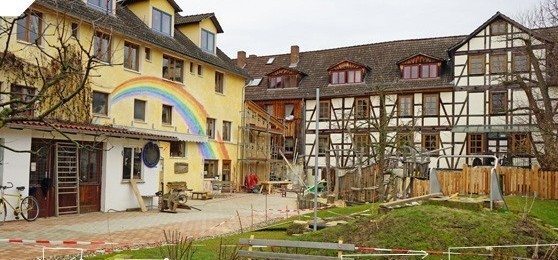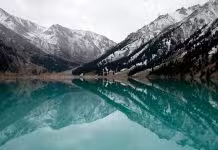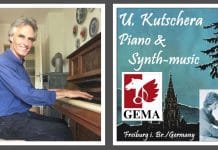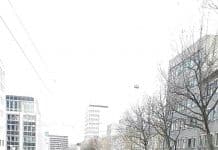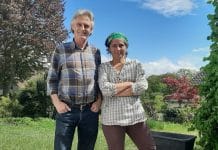Consumer Society and capitalism went without limits and already caused some people to change their lifestyle as a reaction. Groups of people over the entire world reject the conventional society and live “together” in alternative ways. One of them is Niederkaufungen Commune of Kassel/Germany, where 80 people live in solidarity.

Several Examples of communes
In Turkey there have been attempts to start various communes, too. A Turkish movie, called Entel Köy Efe Köye Karşı (Yuksel Aksu,2011), pictured very well how a commune life can be possible in Turkey. İmece Evi, which was first established as an “ecological camp” in 2007, is one of the best examples of the commune life in Turkey today. Imece Evi is located in İzmir/Menemen and mainly focuses on natural agriculture and environmental living styles. The communards also try to create awareness on consumption in Turkey, by showing people their alternative practices and sharing their experiences.
Such commune groups, which are anarchist and against taking for granted society habits, started to appear in Germany under the influence of the Protests of 1968, This kind of communes are rather called Political Communes and nowadays there are about 300 people living in such complexes in Germany.
Niederkaufungen Commune
Niederkaufungen Kommune was founded in 1986 in a town near Kassel (central Germany). It consists of a couple of buildings, yards, gardens and fields. Dedicating themselves to ecological principals, the communards try not to harm the nature and use alternative energy sources as far as possible. Besides, the energy consumed in the commune is less than it produces. They do not use mobile phones and wireless internet in the common areas, in order not to disturb those, who do not want to be exposed to electromagnetic waves. The responsibility for the 20 children in the commune primarily belongs to the parents, but other adults without children also have to spend time with a child.
Almost everybody works at the firms or workshops in the commune, but nobody receives a salary. A couple of them, who work outside their complex, put their salary into the common cash-box. As everybody has equal access to the shared money, nobody feels monetary restraints.
Each member uses approximately 900 Euro from that money for their personal expenses per month. The biggest common expense is food (7700 Euro), since to consume from ecological and ethical production is a crucial principal for the communards. Yet, the overall income of the commune is more than what they totally spend.
At Niederkaufungen Commune, the decisions are taken by consensus, not by voting. The purpose with that is; that nobody has difficulty with the taken decision. Surely, this takes sometimes unending discussions, however as the communards apply Nonviolent Communication techniques, the issues are resolved easier.
In short; Niederkaufungen Commune is an anti-capitalist, non-religious and non-spiritual society, where there is no hierarchy or exploitation of the nature. One of the communards, Steffi Welke, tells us about how it is to live in such place in Germany:
Interview | Steffi Welke
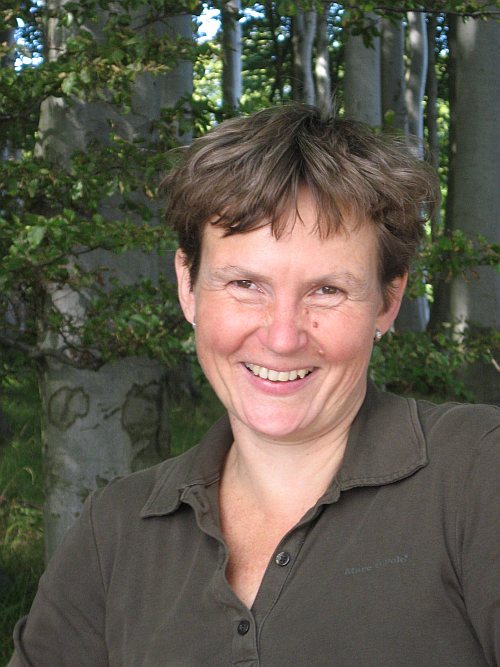
I am 48 years old. 10 years ago, I moved to Niederkaufungen Commune with my two kids. My son is now 18 and my daughter is 20. She has been living abroad for some while, but wants to live here when she is back to Germany.
Before I became mother, I was working with children and young people. One of the groups that I was advising, was Kurdish girls from Turkey. After I had my own kids, I studied Social Services and I have then been working as Social Worker for the State. I give consultations to the schools in Kassel.
I have always been interested in politics, since early age. I participated in many marches or demonstrations, we occupied unused buildings (squatting). But what for me much more important; was not only to discuss those ideas, but to realize them. As a young girl, I also had an commune life experience. I was living with some friends together, cooked and ate together, and used to discuss every day’s event in the evenings. We even had a workshop to fix the old cars.
“What I learned from this life style is that; together we can support each other and share the benefits of our work more.”
How did you end up here?
I finished my study, got myself a job and started a family. By time, I started to realize the life outside my sphere. The ugly sides of the life; fights, broken friendships… Then fights with my partner came about and we ended up our relation. Well, I found myself alone with two kids. I used to work entire day and then evenings took care of my kids. I had no time left for politics or other things. I did not like to live this way and looked for other living alternatives and I learned about Niederkaufungen Commune. I was living around Frankfurt until then.
Here there is a Seminar House. Among others, there are courses about community life there. The first time I came here to take those courses. As soon as I came into the garden, I right away felt like home here. As if I was always supposed to be here.
Why do you think you felt that way? What is special here?
When I was living in the Frankfurt region, I used to read newspaper at the playground, while my kids played there. The other women at the playground rather chated about what a woman said about the other one or what to cook for the dinner, or complained about husbands and children etc. Those topics for me were quite uninteresting and unnecessary to talk about.
“I always wanted to live ecological; tried to eat less meat, to harm the nature less and consume little. What those women talked in the park was quite normal to them and it seemed like they did not care at all about what I am concerned of. I used to feel myself like a foreigner there.”
Here is, of course, different. First of all; we all share pretty much the same ideas, especially about child education and politics. We have a high standard ecological life. All that makes me feel good. Besides, we share everything we have. That is also a nice feeling.
We are here 80 people and there is a kindergarten, seminar house with pension and an elderly home. However, we have only three washing machines, and these are enough for all those peoples laundry. Here nobody has an own car, but we can use one of the commune’s car when we need one. At the building I used to live before, 5 persons lived but there were 4 cars parking in front of the house.
“When we share, we consume less and this is what matters.”

Social equality in commune
Has everybody own rooms? How do you do the daily works?
There are many apartments in different sizes; for couples, friends, families or apartments just to share. Upstairs there is a big apartment, where two families live together; 4 parents and 5 kids. Each flat also has a small kitchen.
We have a big canteen, where the main meals are served three times per day for everybody. Cooking, cleaning and other daily works are being done by all men and women equally in shifts.
What are the advantages and disadvantages of living in a commune house?
For me, the best thing is the social life. There are many like-minded people and lots of social activities. Often come interesting people here to give us lectures or presentations. Sharing everything is, I believe, an advantage. I have access to use the entire complex here. I used to live in a small apartment before I came here. Now, it feels like a palace here. We have lots of fresh and good food, various vehicles, media and training rooms and a huge library. They do not belong to me, but I still own them.
Decision-making in a commune life
What about disadvantages?
Consensus decision-making is a main principal here. That means we are not voting to get the majority, but try to reach a solution, in which everybody agrees. And that requires long and tough discussions.
It should be really difficult to make everybody content.
Yes, sometimes I do not understand why some others think the way they think. Or, things that are important for others can be unimportant for me. Some discussions can be extremely long, some never ends.
What do you have to decide about? Don’t you have fixed rules?
There are some rules that are valid from the very beginning, but by time we see a necessity to update the rules or bring new ones. For example; we have a common account here. Whoever joins us, brings in also all what he/she has, house or car ect. And what we gain during our stay here, also goes to the common account. And whoever needs money gets from that collected money. We try to spend least money, rather share but sometimes some individuals need a big amount of money or we want to buy something for the common use. All those should be discussed among us and be agreed, whether it is necessary to spend money for or not. We register all those money movements in our main office.
Yes, I saw that room. It looks like a big account office. The wall is full with files.
It is also our administration office. Everything is registered there; money inn, money out. After all there are many small firms or working places here. All the paper works are also kept there.
Then the money is a part of the life here. You are not anti-capitalist.
Capitalism and money are not necessarily the same thing. We try to be least capitalistic, but we still have money. We use money. We bought all those houses here, for example. We bought cars. We buy the things from shops, unless we do not produce them here. We, however, try to buy least possible and buy at ecological and fair trade shops. We buy the agricultural products through the CSA (Community Supported Agriculture) system, for example.
Farming done by traditional methods
What is CSA?
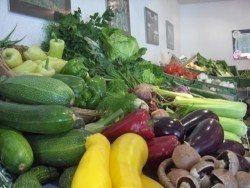
Can you also tell about the firms in your commune?
Within the commune, there are now almost 15 collective enterprises. There is a construction firm with builders and metal workers, a carpentry workshop, an organic market gardening collective, a seminar center team, an organic dairy farm, a kitchen and catering group, and an administrative collective. In addition, a kindergarten and a day-care for old people. All those cover the needs of our people and we also work outside and get income for our commune.
Furthermore, we have here a project called Zukunft erFahren (experiencing the future/future is driving). The Ministry of Transportation covers the budget for that project. We use some electrical vehicles here and write a report to the University about their efficiency, emissions or power consumption and how the car sharing system functions. Here we can also fix our bicycles or some other machines and do recycling.
There is also another machine workshop that is run by one of our friends Marek. Marek invented some machines and a 3D printer. He shreds the plastic and makes a dough and creates another plastic products in his 3D printer. So it is a plastic recycler. How to build that set up can be found in the internet, he did not apply for the patent.
This invention has no patent, you say?
No, he did not apply for it. Those who need this machine most often live far away, like in Africa. So, everybody can build it up and use without permission. Or they can ask Marek to built it up for them. Then, it will not be interesting for companies who want to make big money.
What are the age groups here? How long have they been living here?
The youngest is 4 and the oldest is 68 now. There are some who are over 60 and they have been living here since the beginning. The adults are normally above age 30. There are kids who were born here. There are people who left here after a while, some come back again.
How about being parents or kids here. Do the kids feel theirseves different?
Every child is different. When we came here, my kids were almost teenager. The adolescence period is always difficult, no matter where you live. This town, Kaufungen, is a small place outside the city and the society is quite nice here. Kids have lots of friends outside the commune. Sure, there are things, that kids like and dislike, but overall we do not have any major problems. The kids should start to share the households after age 10, and some do not really enjoy this. What is more; each summer, the kids can go to vacation without their parents, but another adult communard.

The school friends might wonder, how is it to live here.
Yes, but after 30 years we have been already recognized and accepted by the society here. They all know us. For many kids from outside it’s very interesting to be here, because we have a lot of space and possibilities.
Here is Germany’s oldest active commune. Is there any other around here that was established afterwards?
Yes, there are many. They probably had been inspired by Niederkaufungen Commune. Around Kassel there are 4-5 more communes, but they are like 20 people or so. And there are other communes, like religious ones. We are a political commune. There are 30 political communes in Germany and we all are in contact at www.kommuja.de.
What is a political commune?
We have five principals. First of all, we agree on left politics. We do not necessarily belong to a political party, but we all support autonomy, feminism, ecological live or green politics. Some of us are anarchist, do not vote. I am a member of a Green-Left political organization in the town.
What are the other principals?
To share the money, take consensus decisions, work collectively – means no hierarchy no leader, equality between men and women, and living ecological.
Do you have political activities?
Sure. Many of us are from anti-nuclear movements. We do events against gene-manipulated seeds or other unfair agricultural regulations, which exploits farmers’ labor or make small farming difficult.
Why do people live in a commune, what is their philosophy?
We consider ourselves as a “social experiment”. We experiment here how a society can live ethical and fair, and at the same time happy and healthy. How to live together with conflicts, but in solidarity. We do here workshops about Non-violent Communication or self consciousness. There are some groups here who meet regularly and mediate. There is a group of men, for example, who meet since 10 year and talk to each other. It is a kind of self-organized therapy, there is no therapist guiding it.
Any last word?
We want to explore how to live well and humanely. We want to protect the environment and the climate. Above all, we want to contribute to peace in the World. For that aim the most important step is to consume less – especially less fossil energy! There is so much war for oil!
Another life is possible
Let’s imagine that; there is a World there everybody is just and fair, nobody harms the nature, genders are equal and there is no greed, no grudge, no violence. More and more peaceful citizens, who consume less, respect labour and do not waste anything. How about that?
P.S.: Thanks to Hans Weisbrock, another communards of Niederkaufungen Kommune, for his contribution to this article.
> Türkçe okumak için tıklayınız / Click to read in Turkish
Other articles in English
Do Only Women Suffer in Islam?
Interview with Imam Daayiee Abdullah on Homosexuality in Islam
SOAKED Interview with the Storytellers of Downright Soaked Truth
Interview with James Gillies – CERN Spokesman
The Once and Future Music Industry

